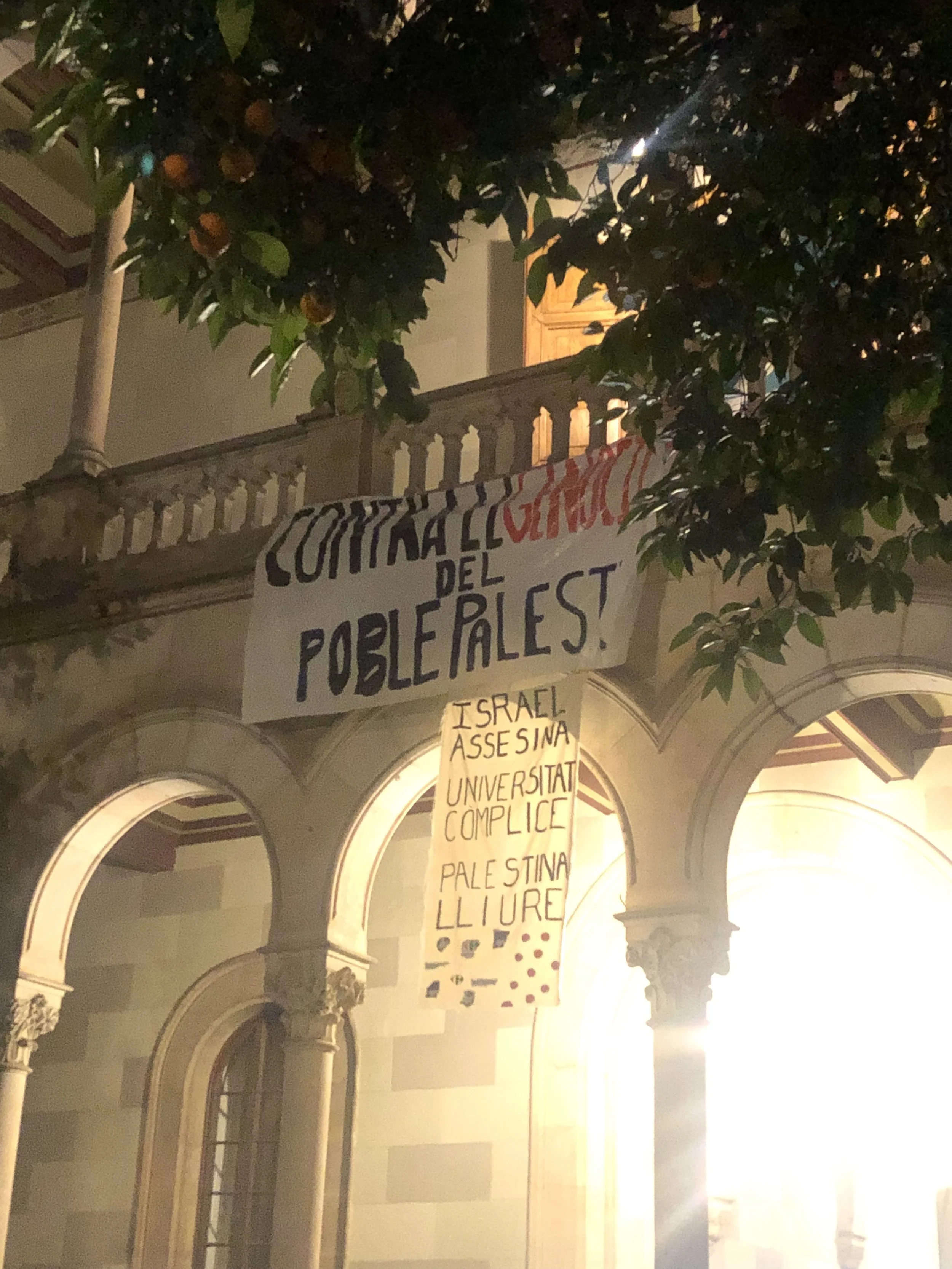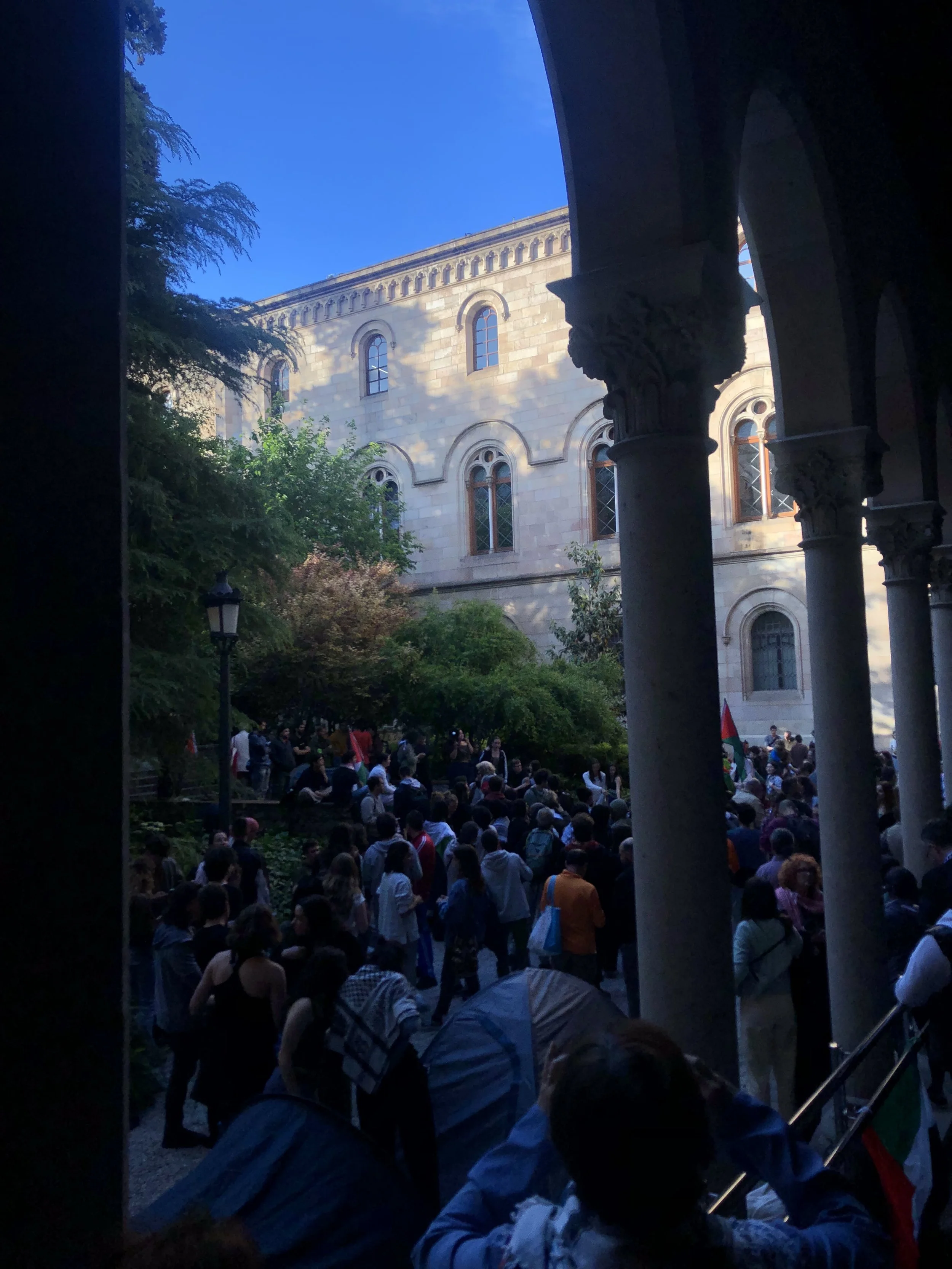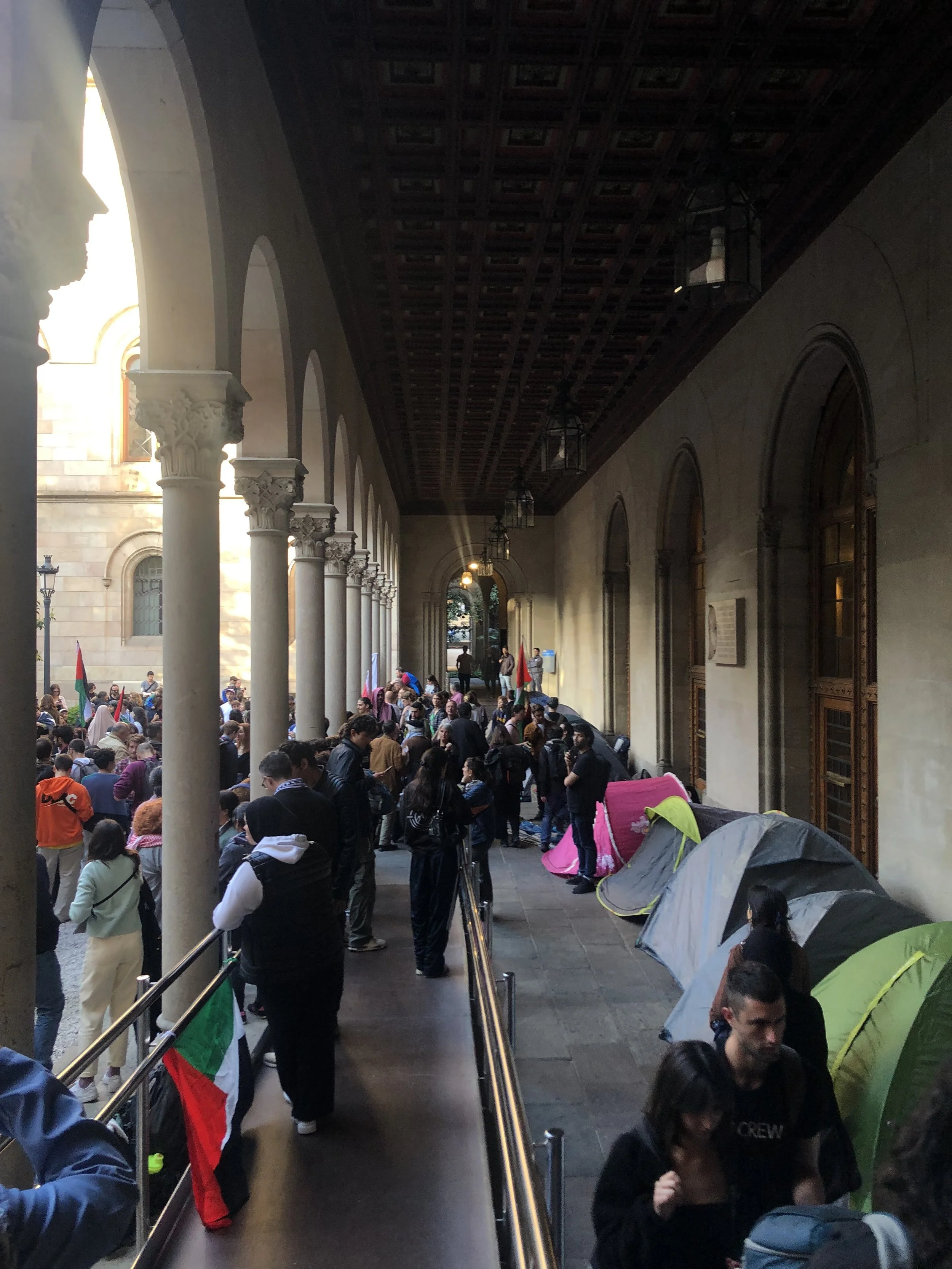Notes From a Student Encampment
By Feargha DeCléir
Photography by Feargha DeCléir
Link to the GoFundMe page:
https://www.gofundme.com/f/help-us-evacuate-warzone-and-rebuild-our-life
The encampment of Barcelona University starts at 6pm on the 6th of May. We congregate in the new campus in El Raval. It is modernist in style, not unlike the Trinity arts block in Dublin. It’s near my flat, just across from the square where skateboarders practice their tricks under the dark gazes of municipal police.
There is a pile of tents and camping equipment by one big pillar, and signs everywhere, mostly in Catalan. I am with my friend C. She is Argentinian, but lived in Chile just after their uprising. She remembers arriving in Buenos Aires to streets that had been torn up by the bare hands of students- secondary school students. She told me of her friends who lost their eyes to rubber bullets.
“But that,” she says, shrugging, “is Latin America.”
And this is Catalonia, I think, looking around. A people not at all opposed to protest.
We stand and chant for a while, and then we move out into the streets. It is 7pm and the sun has not set. We are met with almost universal benevolence. As I leave the university gates, I glimpse the driver of the car nearest to us, who sits at the front of a long line of traffic that will not be moving for some time. He doesn’t seem angry. He is smiling. We walk up through Raval, up to the Placa Universitat, to the oldest part of the Barcelona University Campus. Crossing the road here, the stretch of Gran Via that goes right through the center, is a little trickier- the cars have no time for us, attempt to keep driving, threaten to ram into us.
As we walk down the streets of Raval, and storm into the old stone building of the University, it’s hard not to think of history. In fact, there is something almost too pastiche about walking through the streets of Barcelona shouting in Catalan, like when girls on Instagram post photographs from Italy with handkerchiefs in their hair picking lemons off trees, or tourists in France wear red lipstick and berets. It is as if I am playing a role. And yet- isn’t that free will? To choose the role we wish to play in history? These things are not innate. To be politically mobilized, it seems, is to step outside of that role which we have effortlessly grown into, and choose another one. Today the role we play is of the crowd, roaring in Catalan. I feel I have slipped into the tapestry of someone else's city, someone else’s history.
At the same time, I think, hell to anyone who comes here to think about Lorca but doesn't take to the streets for Palestine.
Lorca would spit in your face.
The campus is a beautiful building of the old Spanish style- a series of courtyards surrounded by arches, with orange trees growing in the middle. We pour through every entrance at once, pour like water, until we are at the main courtyard. Already there are people there erecting tents and tables. On the ground, at the center, a large cloth has been arranged which we gather around. It bears the words:
Contra el genocidi del poble palesti.
I do not speak much Catalan but as I listen to the speeches it seems as though I do. Maybe because I can pick up a lot with my French and limited Spanish, but more than that- I think it’s that I just know. I know what they are saying because what else is there to say? Something unimaginably evil is happening. We must resist it any way we can. We must oppose any institution, government or culture which would allow this to go on for so long. I know what they’re saying.
Four or five days before the encampment, I start talking to a girl on Instagram. Her name is Sojoud and she is in Gaza. She is a highschool student, and has only ever known Gaza, but her sister studied abroad in Spain. I talk to her on my phone, hear about her life. At first she really just wants someone to talk to. She has a GoFundMe linked to her account, with seven thousand euros already raised. I tell her I will donate to it and she tells me not to, not yet. It is frozen, apparently, and though she has raised enough to evacuate and cross the border into Egypt, she can’t access the money. I tell her that I will see what I can do.
I am supposed to be writing a novel. I have deadlines, mini deadlines- and have set up mechanisms to keep me on track: a mentor, a friend. I go to a cafe and get herbal tea (I am trying to cure an ulcer, so there’s a temporary ban on coffee) and try to write for at least two hours a day. I go to the cafe and begin to write- about romance and intrigue and family and deception- but I cannot focus. I email GoFundMe. I do my research.
The trouble is, you can only set up a GoFundMe with an address and a bank account from certain countries. Gaza is not on the list. So Sojoud’s sister put down a German address, her friend’s address, as her own. This has halted the verification process, because, obviously, it isn’t true. We spend several days trying to fix this, but it’s impossible. Time is running out. We decide the only thing to do is start again, this time fully legitimate. I will be the sponsor, and create the fundraiser. They will be the beneficiaries. We need all sorts of documents proving this. I order a second herbal tea, then a third. Two years ago, her sister was studying in a cafe like this. As I work with her to make a campaign video, I splice images of her on Barceloneta beach, by the Arc de Triomphe near Ciutadella park. Now she is in a tent in Rafah. It is important to understand just how interwoven our lives are.
The day that the encampment starts in Barcelona University, I work to get my fundraiser organized. C and I meet in a cafe. The military escalation on Rafah began the night before. I drink a cup of coffee. I send the link to all of my aunts, all of their friends, every contact in my phone. Some of them don’t receive the text on WhatsApp. It’s blocked. What a fucking world.
I have started to work directly with Sojoud’s older sister Alaa, and we talk back and forth all day. I put together a video on her behalf, with her voiceover.
“I hope we didn’t find you too late,” she says.
That night, I stay in the university campus till dark. When I shout I am thinking of Alaa and Sojoud, of my helplessness. To be in community, to be screaming in a group, is the only thing one could be doing right now in order not to go insane.
My friend leaves at dusk and asks if I will be “okay if she leaves me here alone.”
I am not alone.
People are here of every age group. I leave the main courtyard for a moment to catch my breath and find a group of people sitting in a circle, on benches and on the ground, in an adjoining courtyard. They are mostly older people, older activists with mobility aids and gentle demeanors. They remind me a little of my family. They are speaking together, the old and the young. I want to join them, but I hang back. I am embarrassed not to speak much Catalan. Still, there is a feeling of comradeship. Even in a city covered in graffiti that says Guiris out and tourists go home (and rightly so) there is no barrier within the encampment, only a shared goal, only solidarity. I have heard people in the US university encampments say that they are some of the most radically hopeful, community oriented spaces they’d ever experienced. The university is like a little world, in which we act as though the truth is the truth. There is only one sane way to respond to a genocide, only one human way. Yet in society where we see people carrying on as normal, it is easy to fall in line. It's gaslighting on a massive scale. To be in the university is to feel, at least, less cognitive dissonance than the world outside seems to embody.
I leave a little after midnight and stay up for hours in my flat sorting through the GoFundMe, energized by the student’s fierceness.
My friend A comes from Dublin and we spent a few days together. On Thursday, day four of the encampment, we get the news that the university of Barcelona has agreed to the student demands and will be entirely divesting from Israel. We stand on the street outside the university, blocking the traffic on Gran Via, singing and dancing. A buys a packet of gum shaped like watermelons. Afterwards, inside, there is a meeting. Everyone is gathered and listening quietly. To indicate agreement, people shake their hands back and forth, like applause in sign language. More people are smoking than not. Under the arches, a communal meal is being set out.
Just before we went to the street, I got a message from Alaa- we are close to raising the amount of money needed to evacuate Sojoud, but it may be too late.
She fears she will die soon.
I read the text again and again.
I want to show it to someone- send a screenshot to my girlfriend, or something, but it feels cruel to share this, to put this grief on someone. Not that it's even my grief. I’ve only known her for a week. Still, it just goes to show.
If we understood, even a little, how real this is. If we knew each person by name, and their fathers name and their siblings names and their husband-
and if we knew the sound of their voice and the way they spoke about their child and their face and their favorite dress and the places they’d visited in Andalucia-
then nobody in the world would be watching the MET Gala. Nobody would be in Starbucks or watching the Eurovision. Nobody would be anywhere but the streets, the universities. She tells me they will be on the move now, and may not have internet services for a while. If we reach five thousand, she instructs me, I must get in contact with her father in Egypt who will organize the evacuation from the other side. From now on, she will be dark, offline, surviving.
“I love you” she says.
“We will meet in person someday when this is all over,” I say.
“I will do whatever I can to make sure this happens,” she says.
On the twelfth of May, day six of the encampment, Alaa stops responding to my messages. The last thing she posts online is a photo of her baby boy, not yet one years old, and a heartfelt message to him. For if he survives and she doesn’t, something he can read.
It is day eight of the encampment now, though I am not there. I am in bed. My ulcer is back, probably because I have been on my feet constantly and drinking multiple cups of coffee a day. The sun has been shining this week, it smells like summer, urban summer, leaves and pee and cigarette smoke and traffic fumes. I am fundraising for a woman who may already be dead. When I open my email I see notifications of each person who has donated. An overwhelming majority have Irish names. For this, and this alone, I can say with honesty that I am unambiguously proud of my country.
At a protest our voice is amplified, there is a feeling of power. Perhaps the function of protest is to remind us of that power, and maybe also to delude us about it. The voice feels small when you are trying to save a life and you know you might fail. But it’s not my job to worry. It is my job to hope. To keep going. Staunch, that’s the word for what we need to be.
As it happens, I have two best friends currently attending Columbia University, where this movement of student mobilization began. One friend lived in the university encampment from its inception right until they were forcibly removed. The other hasn’t been near it. I see people put their bodies at risk of police violence while others cross the barricade, write their nature poetry, continue business as usual. Sure, they’re wearing the pin. I suppose that's what they’ll tell history. That they wore the pin.
It’s funny, but I have always felt a sense of imposter syndrome around my more educated friends. Who learned to write in hallowed halls from Pulitzer prize winners. I learned to write in my sickbed, mostly as a form of self preservation. To call me and them a writer in the same breath feels almost disrespectful, like comparing a self identified “empath” to a clinical psychiatrist.
Now I wonder what it is they were learning in those classes, if not resistance? Did they not read Didion when she told them to throw themselves into the convulsions of the world?
Did they not hear Arundhati Roy, when she refused to accept the added title of activist, because to toil with the world should be part of the writer's role?
What does it mean to be a journalism student who won’t stand with the journalists being targeted by a genocidal state?
What does it mean to study medicine and not stand outside in solidarity with the doctors who are killed, who operate in blown out hospitals on their own un-anaesthetised children?
It is day eight of the encampment and my ulcer, which I have been taking medication for, is flaring up. If it gets out of hand I might need surgery. It is raining and in the university encampment today Dr Abu Ghassan has come to address the students and give a speech, or Xerrada, as I have learned this week it is called. My catalan is coming along very well, incidentally. Visca la lluita del poble Palesti, for instance, comes very naturally to the tongue at this point. But then Catalan has always been a language of resistance. It is an honour to be a guest in someone else's resistance. That is what I told Alaa. That it is an honour to do the smallest, most microscopic thing in solidarity with the Palestinian people.
I am in bed, waiting for a prescription to be sent, watching the rain fall. Is it silly to have put myself here? Or is it treacherous not to still be out there, no matter the cost? To what extent do we owe the people of Gaza our bodies? And what is an encampment if not a wager- putting the safety of our bodies on the line, the original doctrine of peaceful protest.
And what is more dangerous- to risk the exhaustion, injury or safety of our bodies, or to guard our bodies, stay away from the fight- and risk the erosion of our humanity, our souls? And what is the role of an education, of a writer, of a person, if not to be a defender of whatever flicker of humanity our society still has?
And to those who cross the picket line: what will you write, when you write about this time?
Will your protagonist be a relatable girl? An anemic girl, who “says what everyone's thinking”, who is “as we are, not as we should be,'' who cares more about her boyfriend and her scholarship than Gaza?
I am no longer interested in reading the relatable, self aware, imperfect female protagonist who works away at her ambitions while the world burns.
I am no longer interested in the assumption that this is relatable.
I am no longer interested in asking so little of people, and having people ask so little of me.
I stand with the students, the doctors, the writers, the retirees, who know when it is time to write a nature poem, and when it is time to write a manifesto.
Hell to anyone who comes here to think about Lorca and doesn’t take to the streets for Palestine.



